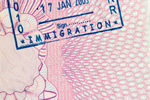Expats in Thailand denied the security of permanent residency

Expats in Thailand denied the security of permanent residency
For many expats worldwide, especially those nearing retirement age, the security of permanent residency is a goal. However, a good number of countries including Thailand make the goal almost unattainable, even if applicants have lived, worked, married and had families of their own whilst in their preferred location.
For a decade and more Thailand has been the destination of choice for expats, whether as a hub for career development, a pleasant, affordable retirement destination or a place where new ideas can be developed and grown into successful businesses. Many incomers, especially those from Western countries, find the loves of their lives, marrying and settling down to raise a family in a friendly location. For many, permanent residency would be the ultimate dream without the need to report to immigration once a year for a visa extension and every three months for the so-called 90 day report.
However, although permanent residency in any world country requires certain criteria, in Thailand it’s far more difficult to obtain. Those expats considered suitable must have had a work permit for at least three years before they apply and have earned at least the huge sum in Thai terms of 80,000 baht ($2,500) every month for two years prior to their application. In addition, they must be able to understand and speak the Thai language, one of the trickiest on the planet for Westerners to learn.
Even for those expats who can support the requirements, it’s still a lottery for foreigners as the number of expats to whom it’s granted is limited to 100 per nationality. This quota has been in place for years, and is supported by Thailand’s immigration offices. Recently, there were hopes the capped number would be increased, but an announcement by the military junta’s leader and Thai prime minister has dashed them by continuing it at the same level.
To many long-term expat residents who’ve married, had families and been financially supportive within the local community for decades, it’s somewhat of a surprise but certainly not a shock to find out yet again that they’ve as much chance of winning the national lottery’s top prize as being permitted legal permanent residency in their chosen country. However, the majority of expats in Thailand would find the financial requirements little short of impossible, and those who could show that level of earnings might well prefer to be permanent residents in countries which, at the very least, welcome them and their contributions to local society.
Related Stories:
- Expats find peace in the covid-19 refuge of Dahab town - July 20, 2020
- Expats in Malaysia still banned from overseas travel - July 17, 2020
- Asian tiger economies reach out to expats in Hong Kong - July 16, 2020
- China hits its expats with 45 per cent tax on overseas earnings - July 15, 2020
- Foreigners and expats condemn Thailand attractions dual pricing - July 14, 2020
- Expats in Denmark get career enhancement and great work/life balance - July 13, 2020
Latest News:
- Tips on a trouble-free relocation as an expat overseas - July 20, 2020
- Expats find peace in the covid-19 refuge of Dahab town - July 20, 2020
- Is Kuwaitization the unintended result of the oil price crash? - July 20, 2020
- Expats unhappy abut changes to Korean points-based visa system - July 17, 2020
- Chiang Mai and Bangkok no longer bargain locations for expats - July 17, 2020
- Expats in Malaysia still banned from overseas travel - July 17, 2020
- Vietnam welcomes expats to its safe, affordable lifestyle - July 16, 2020
- Asian tiger economies reach out to expats in Hong Kong - July 16, 2020
- HSBC Asia to cut back on internal expat relocations - July 16, 2020
- Tips on integrating for newly-arrived expats - July 15, 2020


